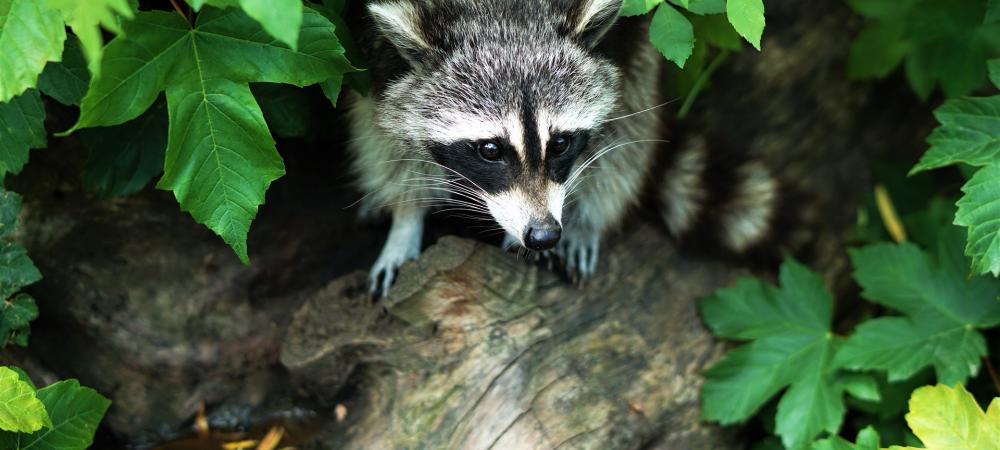Raccoon and Skunk Mating Season

As the new year begins, so does mating season for many wildlife animals. In particular, raccoons and skunks have very similar mating seasons and seek out similar places to give birth to their young—your home.
If a skunk or raccoon is passing by or seeking out food, it could be either a female or male. However, if one of these animals are seen during the months of March through September, it should be assumed that it is a female raccoon or skunk searching for a place to nest and have her babies.
Raccoon Mating Season
Raccoons are incredibly agile critters. They are nocturnal and also great climbers, meaning that they can get into spaces without being seen.
Female raccoons seek out resources and dens for their young after mating season. A raccoon’s mating season occurs during late winter and early spring. With a 9 week gestation period, this means they could be giving birth anytime between March and September, with the peak birth month being May.
The perfect den for a female raccoon to have her babies is dark, warm, and dry. This means your chimney, attic, shed, basement, and underneath decks or porches is the perfect place for them to have their young.
Female raccoons give birth once a year to 3 to 7 little raccoon babies that are born blind and incredibly dependent on their mother. Male raccoons do not stay to raise the young, and the mother does it entirely alone.
The young raccoons will stay in their den site for approximately 8 weeks until they are able to go outside with their mother to explore.
Female raccoons will stash their babies in places that are usually impossible for humans to find. If a litter of kits is found without the mother, it is highly advised to leave them alone.
Mother raccoons will leave their young to seek out food for them. Only if a mother is not seen returning after a day or more should it be assumed that the kits are orphaned.
If this were to occur, it is recommended to reach out to a pest control professional, as baby raccoons require extreme care when handling. Also, if a mother were to return to a human disturbing her den and babies she would likely become very aggressive, which is a very dangerous scenario.
An experienced pest control specialist will be able to remove both the raccoon mother and her babies with minimal stress.
Skunk Mating Season
A skunk’s mating season is notably comparable to a raccoons. A skunk also mates in late winter and early spring, generally from February to March.
Depending on when a female skunk was born determines when she will mate. A female born later in the year will wait longer to mate, as she is not mature enough to mate during the usual time.
The main difference between raccoon and skunk mating seasons is that a skunk’s mating season is a lot smellier.
Male skunks will spray each other when fighting over a female skunk, and female skunks will spray an odor when they are not interested in mating with the male skunk.
Female skunks are pregnant for 60 days before giving birth to 4 to 7 babies. Like raccoons, skunk babies are also referred to as kits and are born blind and dependent on their mother. Male skunks do not raise the young with the female.
Skunks are not as agile as raccoons are, but they are still great at digging. A female skunk seeking shelter for her babies is most likely to reside underneath sheds, decks, or porches.
Skunk babies will stay in their den for approximately 6 weeks before they are able to venture out with their mother. At this point, they are already becoming self-sufficient.
The danger of finding baby skunks without their mother is the same as finding raccoon kits. Touching the skunks puts a human scent on them, and puts you in danger of getting bitten and contracting a disease.
One thing that skunks have over raccoons is that they can not only bite, but will also spray whatever poses a threat to their young. Skunks can become very aggressive, especially when they are mothers protecting their offspring.
This is why it is highly advised to contact a wildlife control professional to handle the problem. This ensures the safety of you and your family, as well as the wellbeing of a mother skunk and her young.
Our Advice to You
To avoid dealing with any of these situations, prevention is key.
As noted above, it is important with any of these scenarios to hire a pest control professional. Pest management, especially during mating season, is rarely a do-it-yourself project.
In preparation for mating season, pest control management and prevention starts with exclusion work. Exclusion work entails seeking out all possible entry points for pests and rodents and closing them off.
Exclusion work may be done before and/or after an infestation depending on the situation. If raccoons or skunks have already started nesting somewhere in or under your home, wildlife removal will need to be done first.
Blocking entry points without looking for the wildlife first means that there is a possibility an animal could be trapped in there. This could lead to even more issues of having to reopen entry points and hope that the animals are still alive.
There are also safety risks involved when dealing with any wildlife, especially with mothers. As mentioned previously, skunks and raccoons can both carry diseases and can both bite if they feel threatened.
Accounting for all these factors, it is recommended to hire a pest control professional. Doing it on your own could lead to avoidable consequences.
All N One is here to protect you, your family, and your home from wildlife animals such as skunks and raccoons. We have helped many families like yours by preventing and controlling wildlife invasions!
